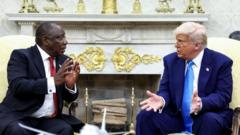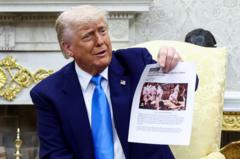In a significant policy review, South Africa is on track to permit Starlink's operations, stirring debates around historical racial laws and the implications of foreign investments.
**South Africa Moves Towards Starlink Licensing Amid Controversy**

**South Africa Moves Towards Starlink Licensing Amid Controversy**
The proposed regulatory shift could enable Elon Musk's satellite service to operate in South Africa without requiring Black ownership shares.
In a notable development for the technology and telecommunications sectors, the South African government has initiated a policy review that could potentially open the door for Elon Musk's Starlink service to operate within its borders. The regulatory shift would eliminate the current requirement for foreign companies, like Musk's satellite internet venture, to offer ownership shares to Black South Africans, a stipulation established to rectify historical injustices from the apartheid era.
The existing laws were designed to address the economic disparities that have lingered following the end of apartheid over three decades ago. Despite their intention to support previously marginalized groups, the policy has drawn criticism from Musk himself, who has labeled the ownership requirement as "racist." In a tweet earlier this year, Musk provocatively noted, “Starlink is not allowed to operate in South Africa because I’m not black.”
The timing of this policy review coincides with Musk's recent participation in a controversial meeting at the White House, where discussions included President Trump confronting South African President Cyril Ramaphosa with misleading allegations regarding violence against white farmers. Following this confrontation, it appears that American companies could see exemptions from the ownership rules, allowing Musk's venture to be one of the first beneficiaries.
Analysts suggest that by facilitating Starlink's entry into South Africa, President Ramaphosa may be aiming to rejuvenate business relations with the United States and negotiate new trade agreements. This could mark a pivotal moment not just for Starlink, but also for foreign investment flows into South Africa, reshaping the local technology landscape while reigniting the broader debate on economic equality and historical reparations.
The existing laws were designed to address the economic disparities that have lingered following the end of apartheid over three decades ago. Despite their intention to support previously marginalized groups, the policy has drawn criticism from Musk himself, who has labeled the ownership requirement as "racist." In a tweet earlier this year, Musk provocatively noted, “Starlink is not allowed to operate in South Africa because I’m not black.”
The timing of this policy review coincides with Musk's recent participation in a controversial meeting at the White House, where discussions included President Trump confronting South African President Cyril Ramaphosa with misleading allegations regarding violence against white farmers. Following this confrontation, it appears that American companies could see exemptions from the ownership rules, allowing Musk's venture to be one of the first beneficiaries.
Analysts suggest that by facilitating Starlink's entry into South Africa, President Ramaphosa may be aiming to rejuvenate business relations with the United States and negotiate new trade agreements. This could mark a pivotal moment not just for Starlink, but also for foreign investment flows into South Africa, reshaping the local technology landscape while reigniting the broader debate on economic equality and historical reparations.





















